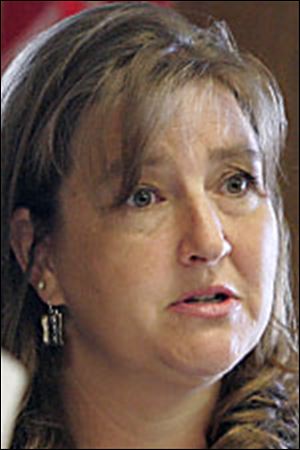
FEATURED EDITORIAL
Smart justice
Lucas County needs an adult felony drug court to treat drug offenders and addicts more effectively
8/10/2014
Cook
Ohio operates 48 adult drug courts in 27 counties. It’s absurd that Lucas County, the center of the state’s fourth largest metropolitan area, isn’t one of them.
Except for Hamilton County, Lucas is the state’s largest county without an adult drug court. Many counties a fraction of its size — including Hardin, Belmont, and Hocking — operate busy and productive specialty drug dockets.
Click here to read more Blade editorials.
It’s not for a lack of need. An urban area with more than 440,000 people, Lucas County is battling an opioid and heroin epidemic, as is the rest of the state. Heroin-related deaths in the Toledo area more than doubled last year — to 80 from 31 in 2012 — and are on pace nearly to double again this year.
Lucas County Common Pleas Court Judge Stacy Cook, one of 10 local common pleas judges, told The Blade’s editorial page that 80 percent of her caseload could benefit from a drug court. To her credit, Judge Cook already employs many of the policies and practices that are typically found in drug and other specialty courts: close supervision, community-based treatment, early intervention, and immediate sanctions as an alternative to incarceration. She prefers the term “recovery court,” noting that deep-seated abuse and trauma underlie many problems of addiction.
Other Common Pleas Court judges, including Myron Duhart, Gene Zmuda, Frederick McDonald, Gary Cook, and Ruth Ann Franks, have incorporated some of the practices of a drug court model. But the entire bench would benefit from a specialized docket, including a dedicated probation officer to help with community supervision.
Lucas County’s last adult drug court ended nearly a decade ago, partly because of funding problems. The county has continued to operate a juvenile and family drug court.
With the help of the Ohio Supreme Court, which certifies specialty dockets, local drug courts aren’t difficult to set up. Courts that operate specialized dockets are required to apply to the Supreme Court and undergo a site visit. Other examples of specialized dockets include mental health and veterans courts.
The Lucas County Board of Commissioners would have to support the drug docket and approve a modest amount to fund it, including the hiring of a probation officer. Carol Contrada, the president of the board, told The Blade’s editorial page she supports the idea. “There’s a need for it here,” she said. “Drug courts have worked well in other places.”
As commissioners prepare the 2015 county budget, it’s a good time for judges to put together a plan, including grant possibilities. Continuing to lock up low-level and generally nonviolent drug offenders, at an annual cost of more than $25,000 each, is inhumane and ineffective. It’s a wasteful revolving door.
Gary Mohr, director of the Ohio Department of Rehabilitation and Correction, has said repeatedly that he wants more low-level drug offenders diverted from prison into community-based treatment programs that can better help them become productive citizens. Drug courts are a good way to do that.
Lucas County has done a commendable job of battling the state’s opioid epidemic. The county’s Mental Health and Recovery Services Board is one of the most effective in Ohio.
County Sheriff John Tharp has created an innovative addiction resource unit to investigate drug overdoses and work with victims and their families to get people into treatment. But like Judge Cook, Mr. Tharp understands that the community needs to do more, including the creation of a local adult drug court. “They’ve proven themselves to be successful,” the sheriff told The Blade’s editorial page.
It’s time for Lucas County to join the dozens of other communities in Ohio that use adult drug courts to administer justice in a more effective, efficient, and humane manner.